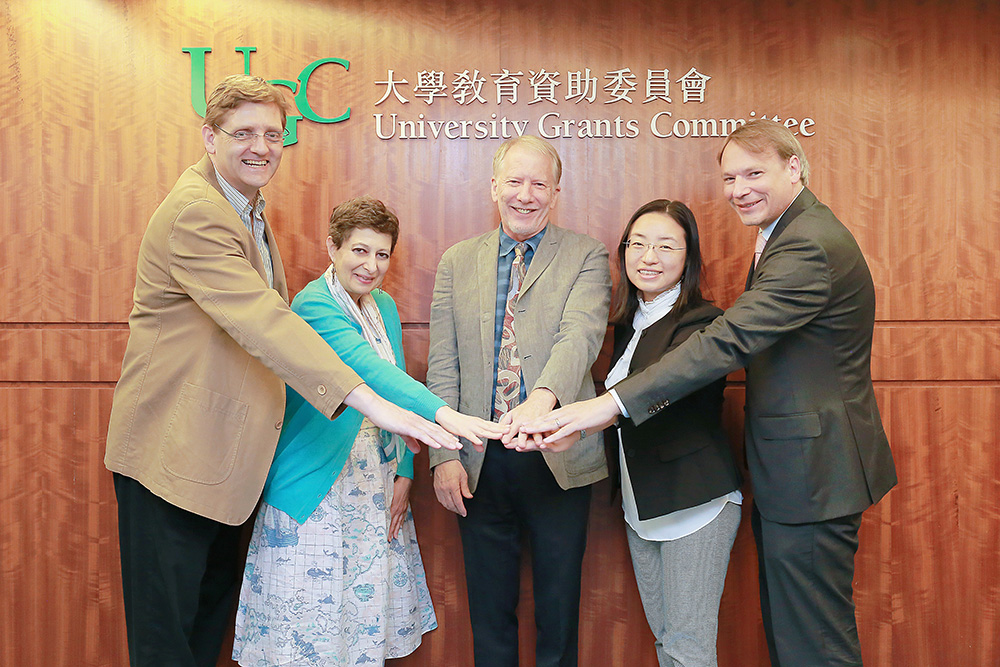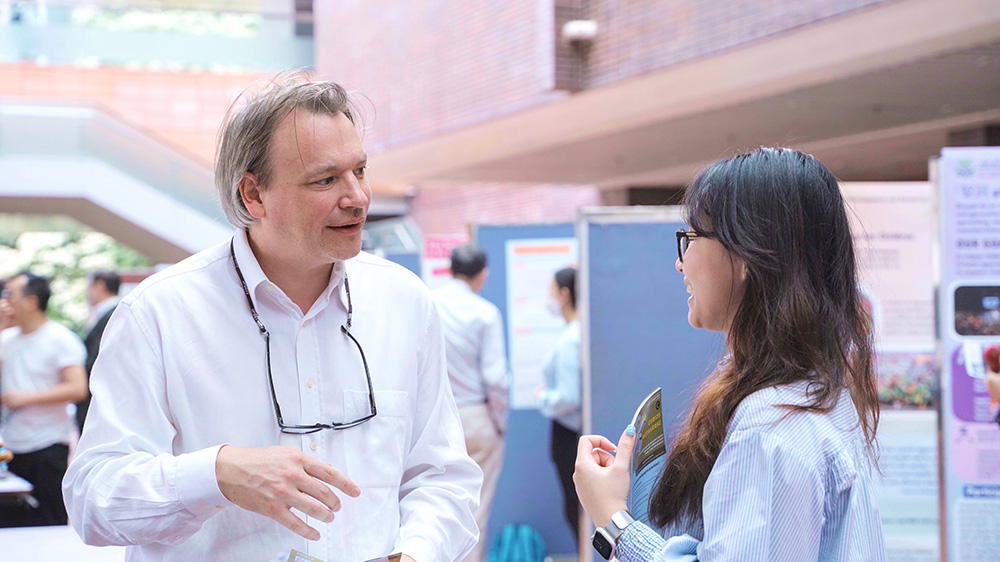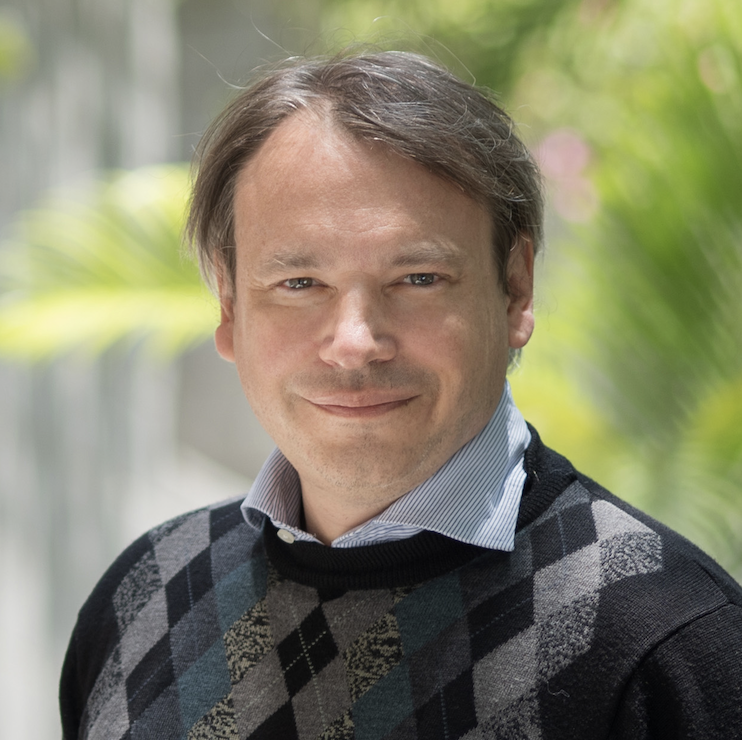May 2023 | Volume 24 No. 2
Breaking down Barriers
HKU’s Common Core was launched in 2012 to bring together undergraduate students from all faculties to engage in multidisciplinary emerging topics, ranging from climate change to nature-inspired innovations to Chinese cities to the human mind. Its 150-plus courses have also provided space for teachers to collaborate and innovate – among them, Professor Julian Tanner, the new Director of the Common Core.
Professor Tanner had been interested in multidisciplinary teaching and learning even before the Common Core launched. He developed one of the first Common Core courses, on synthetic biology, then piloted undergraduate transdisciplinary research as convenor of one of the four Areas of Inquiry under the Common Core, on Science, Technology and Big Data.
“Teaching in the Common Core means teaching in a different way so all students across the University can understand and engage and provide their own perspectives. There’s a lot of active learning and debates and space to innovate in both content and assessments, so it’s a really rewarding experience,” he said.
Professor Tanner saw his own disciplinary teaching enhanced by the experience – he brought model-making of DNA from the Common Core back to first year biomedical students, and he has advocated for innovations in large-class active learning in the first two years of the MBBS curriculum.
After seeing the enthusiasm with which Common Core students embraced opportunities to ask questions and explore the world more widely, he decided to throw his hat in the ring when Professor Gray Kochhar-Lindgren announced he would step down as Director effective the end of 2022.
Innovation outlook
Professor Kochhar-Lindgren spent eight years laying a solid foundation of courses and networks both within and beyond the University. Professor Tanner will be driving these forward, with a particular focus on getting students engaged in multidisciplinary research and promoting innovation and international perspectives in teaching.
He cites the COVID-19 pandemic as an example of the importance of multidisciplinary learning: solutions to its impact have had to come not only from medicine, but also economics, psychology and other disciplines. “Finding solutions and doing research with real impact on the community is at its core very multidisciplinary. Of course, it’s important that students develop expertise within their discipline, but I think early on as undergraduates, they should also be exposed to the multidisciplinary angle,” he said.
Professor Tanner has such experience both as teacher and researcher. In the pilot transdisciplinary research programme, he mentored students from different disciplines who surveyed awareness about hepatitis C in Hong Kong and Canada, providing insight into different perspectives globally. The project’s success contributed to the Common Core team receiving the University Grants Committee’s 2019 Teaching Award (Team), awarded to one team across Hong Kong each year for teaching excellence.
As a researcher specialising in chemical biology and DNA nanotechnology, Professor Tanner also works closely with colleagues in medicine, engineering, dentistry and science, including an ongoing collaboration with Professor Anderson Shum Ho-cheung of the Department of Mechanical Engineering to develop new methods for diagnostics that integrate microfluidics with molecular biology.
“I think it’s important as a research-led university that we have more student-led, curiosity-driven research amongst undergraduates. It’s a big challenge with large classes but I hope the Common Core can move towards promoting a research culture and opportunities for interdisciplinary research,” he said.

The Common Core@HKU: Transdisciplinarity-in-Action Team was the recipient of the 2019 UGC Teaching Award.
Preparing students for the future
Professor Tanner hopes to provide space for teachers to innovate in how they use Common Core teaching time – to think more in terms of flipped classrooms and other active learning methods where students solve problems and collaborate in class, rather than passively receive lectures.
Furthermore, he will be pushing forward international opportunities for both students and staff, especially now that COVID-19 restrictions have abated. He wants students to participate not only in Common Core-related activities in Mainland China and overseas, but also HKU’s Collaborative Online International Learning programme, which enables students from HKU and partner universities overseas to collaborate using digital technology. “I’m really interested in what the University can do to help prepare students more broadly for their careers and futures by thinking globally, creatively and across emerging disciplines,” he said.
He will have his work cut out for him, dividing his time between the School of Biomedical Sciences and the Common Core, where he is supported by a strong administrative team and Associate Director Dr Jack Tsao. But he draws motivation from seeing many of the best teachers at HKU engage with the Common Core and improve their own teaching in light of that experience.
“There are so many incredible people working at HKU, and it’s a huge privilege to interact with students and staff across all 10 faculties,” he said.

Professor Tanner at the Student Learning Festival 2022–23 that showcases interdisciplinary and international student work from across faculties.
I think it’s important as a research-led university that we have more student-led, curiosity-driven research amongst undergraduates. It’s a big challenge with large classes but I hope the Common Core can move towards promoting a research culture and opportunities for interdisciplinary research.

PROFESSOR JULIAN TANNER

